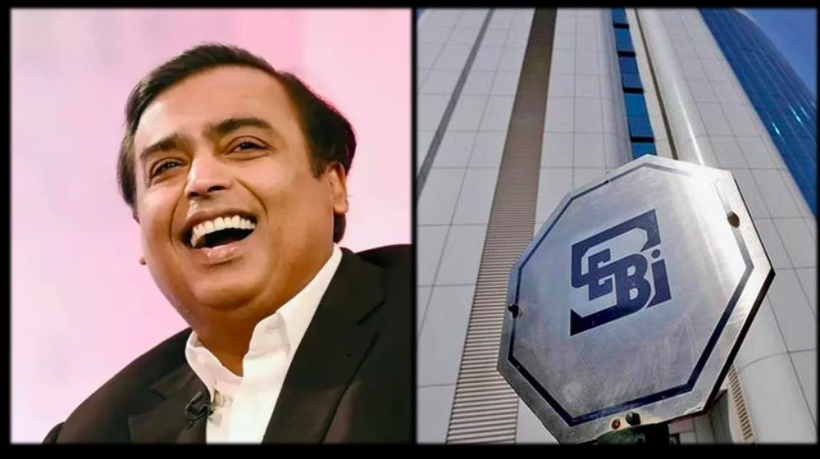How a Change in a Rule by SEBI Helped Reliance Raise Rs 53,000 crore

Mumbai/Gurugram: The price of the share of Reliance Industries Limited (RIL), headed by India’s richest man Mukesh Ambani, jumped to a record high of more than Rs 1,804 on Monday June 22. RIL thus became the first Indian conglomerate with a market capitalisation in excess of $150 billion or nearly Rs 11,44,00,00,000,000.
(Market capitalisation is the amount arrived at by multiplying the price of a company’s share at a particular point in time with the total number of its shares.)
RIL’s Chairman and Managing Director Mukesh Ambani’s net worth zoomed to $64.5 billion, making him the only Asian among the world 10 richest individuals, according to Bloomberg.
Between May 20 and June 3, RIL conducted a rights issue of its shares. (In a rights issue, a company raises funds by offering shares to its existing shareholders sometimes at a discounted rate.) The rights issue by RIL will raise Rs 53,125 crore––the biggest amount ever raised through such an exercise by any Indian company.
In two of the five previous articles published in NewsClick, we examined this rights issue in detail, looking at RIL’s valuation and the changes in government rules and norms that facilitated, and made it easier to conduct, such a capital issue.
In this article we look at a far more significant rule change that made RIL eligible to conduct the rights issue in the manner it did. The entire fund-raising effort would have not been possible had it not been for a crucial change in the fineprint of a set of regulations issued by the Securities and Exchange Board of India (SEBI), the regulator of India’s stock markets and financial sector.
In a notification issued on April 21, SEBI relaxed certain rules that prevent a company from seeking to conduct a rights issue of shares in a “fast track” mode––as RIL did––if there are ongoing cases against the company in which SEBI has alleged that there have been violations of laws relating to trading of securities.
The relaxations suited RIL perfectly, as the company is currently in an adjudication proceeding relating to allegations of insider trading levelled by SEBI and would, therefore, have been barred from conducting a fast-track rights issue. RIL’s board approved the rights issue nine days after the SEBI notification, on April 30.
Reliance’s Plan to Become Debt-Free
On June 20, Ambani announced that RIL was now “debt-free” having raised Rs 1.68 lakh crore since the beginning of April. This came as the culmination of a plan put in motion in August 2019 when, at RIL’s annual general meeting, he announced that the company was planning a number of deals to pare down its debt burden that stood at Rs 1.54 lakh crore at the end of March 31, 2019.
As described in our earlier articles, after a $15 billion planned investment in RIL’s petroleum refining and petrochemicals businesses by Saudi Arabia’s Aramco––that formed a major part of the capital raising plan announced by Ambani––fell through, the company put in place an alternate route to raise funds.
April onwards, Jio Platforms Limited––a subsidiary of RIL––has been on a fund-raising spree through stake sales. In 11 investment deals announced so far, the company has raised around Rs 1.1 lakh crore, by selling over a fifth of its ownership stake.
Jio Platforms is the parent company of RIL’s various digital and telecommunications companies, including Reliance Jio Infocomm Limited, which is the company behind RJio’s internet, mobile, data and television services, and Jio Saavn, Jio Cinema and Haaptik, among others.
Over and above Facebook Inc., the American social media giant, the rest of the investors have been a clutch of US-based technology-focused private equity funds that typically invest in software and tech start-ups, while three other investor companies that stand out are sovereign-controlled investment funds based out of Abu Dhabi and Saudi Arabia.
Announced on April 30, RIL’s rights issue was not just India’s biggest but also the first of its kind for the company in over three decades. For two weeks, between May 20 and June 3, RIL’s shareholders were entitled to buy fresh RIL shares at a discounted rate.
For every 15 shares held by a shareholder, one share was on offer at a 14% discount on the stock’s closing value on April 30. On June 3, when the rights-issue closed, it was reported to have been “oversubscribed” by 1.59 times the announced value of Rs 53,125 crore.
Critical Rule Change by SEBI
What was the rule change by SEBI that made it possible for RIL to conduct its rights-issue exercise in the first place?
The legal and statutory requirements for conducting rights issues are governed by SEBI’s Issue of Capital and Disclosure Requirements (ICDR) Regulations. SEBI’s April 21 circular notified changes to several rules laid out in the ICDR regulations.
Stating that “in the wake of developments relating to the COVID-19 pandemic, a number of suggestions have been received by SEBI from industry bodies and market participants for easing of conditions relating to raising of funds from the securities market,” the circular sought to ease the compliance burden for companies seeking to raise funds.
One particular relaxation of an ICDR regulation concerned companies that are facing charges of violations of Indian securities laws. Rule 99 of the ICDR regulations govern the eligibility conditions for companies to conduct a rights issue in fast-track mode. Sub-rule 99 (h) of the ICDR regulations specified that only those companies against which “no show-cause notices have been issued or prosecution proceedings have been initiated by the Board and pending against the issuer or its promoters or whole-time directors as on the reference date” are permitted to conduct a fast-track rights issue of shares.
The April 21 circular modified Rule 99 (h) of the ICDR regulations to read as follows:
“no show-cause notices, excluding under adjudication proceedings, have been issued by the Board and pending against the issuer or its promoters or whole-time directors as on the reference date;
“In cases where against the issuer or its promoters/directors/group companies,
“i) a show cause notice(s) has been issued by the Board in an adjudication proceeding or
“ii) prosecution proceedings have been initiated by the Board;
“necessary disclosures in respect of such action (s) along-with its potential adverse impact on the issuer shall be made in the letter of offer.”
This relaxation allowed companies against which there were ongoing adjudication and prosecution proceedings by SEBI to conduct rights issues by disclosing these proceedings in their letter of offer announcing the rights issue, whereas under the earlier version of the regulation, such companies would have been barred from going ahead with the issue.
As it so happens, perhaps not coincidentally, RIL is currently facing such a proceeding, relating to a charge of insider trading that goes back over a decade. It was this rule relaxation that made it possible for RIL to conduct its rights issue.
Insider Trading Charges Against Reliance
In the letter of offer for its rights issue, under the heading “outstanding litigation and defaults,” RIL has made the following disclosure:
“On December 16, 2010, SEBI issued a SCN [show cause notice], inter alia, to our Company and the erstwhile Pipeline Infrastructure (India) Private Limited (since merged with Sikka Ports & Terminals Limited, an entity belonging to the promoter and promoter group of our Company) (together, the “Noticees”) in connection with the trades of our Company in the shares of Reliance Petroleum Limited, the then subsidiary of our Company, which has since been merged with our Company.
“In 2011, consent (settlement) applications were filed by the Noticees before SEBI, which were rejected. Meanwhile, hearings were held before the Whole Time Member (“WTM”) of SEBI in respect of SCN. By an order dated March 24, 2017, the WTM of SEBI passed directions: (i) prohibiting, inter alia, the Noticees from dealing in equity derivatives in the ‘Futures & Options’ segment of stock exchanges, directly or indirectly, for a period of one year from the date of the order, and (ii) to our Company to disgorge an amount of ₹447.27 crore along with interest at the rate of 12% per annum from November 29, 2007 through the date of payment.
“In May 2017, the Noticees, inter alia, filed an appeal before the Securities Appellate Tribunal (“SAT”) against this order. SAT had stayed the direction on disgorgement until the disposal of the appeal. The appeal has been heard by SAT and is reserved for orders. The prohibition from dealing in equity derivatives in the ‘Futures & Options’ segment expired on March 23, 2018. The matter is currently pending.
“Further, on November 21, 2017, SEBI issued SCN, inter alia, to our Company and the Chairman and Managing Director, in the same matter concerning trading in the shares of Reliance Petroleum Limited by our Company in the year 2007 asking our Company and the Chairman and Managing Director, to show cause as to why inquiry should not be held in terms of SEBI (Procedure for Holding Inquiry and Imposing Penalties by Adjudicating Officer) Rules, 1995 and penalty not be imposed under the provisions of the Securities and Exchange Board of India Act, 1992.
“Our Company and the Chairman and Managing Director have made written submissions in response to the SCN, including on June 15, 2018, September 12, 2018 and September 20, 2019. Hearings were held before the Adjudicating Officer on September 11, 2018, January 24, 2020 and March 12, 2020 and the matter is part-heard. The matter, in which adjudication proceeding(s) have been initiated, is currently pending. Any adverse outcome of the proceeding may have an impact on the reputation of our Company.”
The case referred to relates to accusations of insider trading in the shares of Reliance Petroleum Limited. The adjudication order passed by G Mahalingam, a whole-time member of SEBI, declared that in November 2007, RIL and 12 other companies that acted as its “front” companies, conducted a “well-planned, fraudulent and manipulative trading scheme...aiming at reaping huge speculative profits.”
The March 2017 order by Mahalingam held that RIL had made illegal gains of Rs 447.27 crore, and accordingly ordered the company to disgorge that amount, and as a penalty, banned RIL from participating in the equity derivatives market for one year. (Disgorge is a term used to describe payment of money by an entity against its wishes or unwillingly.)
As RIL disclosed in its letter of offer, while the company is currently appealing the March 2017 order before the Securities Appellate Tribunal (SAT), another SCN in the same case was issued by the SEBI in November 2017, hearings on which are still going on.
It is clear that were it not for the SEBI’s relaxation of the ICDR regulations through its April 21 circular, RIL would not have been able to conduct its record-breaking rights issue that enabled it to raise over Rs 53,000 crore.
Filing of Draft Letter of Offer Discarded
Another change in the ICDR Regulations brought about by the SEBI’s April 21 notification enabled RIL to conduct its rights issue expeditiously.
Under the earlier ICDR regulations, a company seeking to conduct a rights issue to raise over Rs 10 crore was required to first file a draft of its letter of offer with the SEBI. The regulator was given a month’s time to respond with comments and observations and to direct any changes to the draft letter of offer following which the company was required to file a new draft letter complying with the SEBI’s directions. These requirements were laid out in Sections (1), (2), (4) and (5) of Rule 71 of the ICDR Regulations.
The SEBI’s April 21 circular did away with these requirements altogether. “Nothing contained in sub-regulations (1), (2), (4) and (5) of the Regulation 71 shall apply if the issuer satisfies the conditions mentioned under Regulation 99 of ICDR Regulations for making a rights issue through the fast track route,” it states.
That RIL was able to conduct its rights issue within a mere 20 days of announcing it was a direct result of this relaxation by SEBI.
Was SEBI’s Rule Change Justified?
The principle of disallowing companies accused of violating securities laws from raising capital by conducting rights issues on the stock market, is that an entity accused of fraud on its shareholders should not be permitted to seek to raise funds from the same shareholders. The authors of this article are of the view that it far from apparent how the COVID-19 pandemic and the consequent economic slowdown, warranted doing away with this principle.
On the morning of June 22, one of these authors of this article emailed a questionnaire to Ajay Tyagi, Chairman, SEBI, and the official who heads the communications department in the board. No response was received at the time of publication. This article will be updated if a response is received.
The questions asked of the SEBI Chairman were:
-
What representations from which companies and/or industry bodies and/or market participants did SEBI receive prior to its proposal to relax the ICDR regulations on rights issues on April 21, 2020?
-
Since the relaxations of April 21, 2020, which companies have conducted fund-raising exercises by means of rights issues under the relaxed terms?
-
It is claimed that only one company (Reliance Industries Limited or RIL) has benefited from SEBI’s relaxations. Is this correct? If yes, your comments are solicited.
-
RIL was declared to have undertaken a “well-planned, fraudulent and manipulative trading scheme...aiming at reaping huge speculative profits” by the order of SEBI’s whole-time member G Mahalingam on March 24, 2017. In that order RIL was ordered to disgorge Rs 447.27 crore of illegal gains made by it through insider trading of shares of Reliance Petroleum Limited in November 2007, and the company was banned from directly or indirectly dealing in equity derivatives in the “futures and options” segment of stock markets. Another show cause notice (SCN) in the same case was issued by SEBI to RIL on November 21, 2017, and adjudication proceedings on that SCN are going on at present. RIL stands accused of securities law violations by the SEBI, in which the victims of the violations are RIL’s own shareholders. How does the COVID-19 pandemic warrant permitting a company accused of securities law violations against its shareholders to raise funds by means of a rights-issue from the same shareholders?
Reliance Breaks Records When Economy Is Depressed
RIL has broken a number of records over the last few days on the back of investments in its telecommunications and mobile internet data services arm, Reliance Jio, together with the resounding success of its rights issue of shares. From the beginning of the year till the close of trading on June 22, RIL’s share price had risen by over 16% whereas the benchmark sensitive index of the Bombay Stock Exchange had declined by almost a similar proportion in this period.
The pro-business Economic Times made the following observations on June 22 about the country’s richest man:
“The rise of the 63-year-old as India heads for its worst-ever recession is a reminder of the nation’s deep economic divide, in which the top 10% hold more than three-quarters of the total wealth, and where most new fortune creation stays in the hands of the richest 1%. Ambani lives in a 27-story mansion in Mumbai, known as Antilla, that has three rooftop helipads, parking for 168 cars, a 50-seat movie theater, a grand ballroom with crystal chandeliers, three floors of Babylon-inspired hanging gardens, a yoga studio, and a health spa and fitness center.”
We spoke to two analysts on the implications of SEBI’s April 21 circular for RIL’s rights issue. Both agreed to speak on the condition that their names would not be disclosed.
One said the role of the regulator is to ensure that markets are fair and that the playing field is level. “This does not seem to have been the case,” he said, adding that the market regulator in the United States, the Securities and Exchange Commission or SEC would have been “far stricter in this regard.”
Another analyst remarked that the manner in which the government and regulatory authorities have amended rules and regulations for the benefit of India’s biggest company led by the country’s richest man, makes him wonder yet again whether Mukesh Ambani and his conglomerate are “more influential” than the government of India.
(To be continued.)
This is the sixth article in the series. Links to the first five articles are given below:
Read Also: Ambani Family Reshuffled Shares in Reliance Industries Before Facebook Deal
Read Also: Is Reliance’s Rights Issue Over-Valued?
Read Also: Did the Government Help Reliance Industries Raise Rs 53,000 crore?
Read Also: Foreign Investments in Reliance Jio: A Security Concern?
Read Also: RBI Hike in Banks’ Group Exposure Limit to Benefit Reliance
The authors are independent journalists.
Get the latest reports & analysis with people's perspective on Protests, movements & deep analytical videos, discussions of the current affairs in your Telegram app. Subscribe to NewsClick's Telegram channel & get Real-Time updates on stories, as they get published on our website.
























